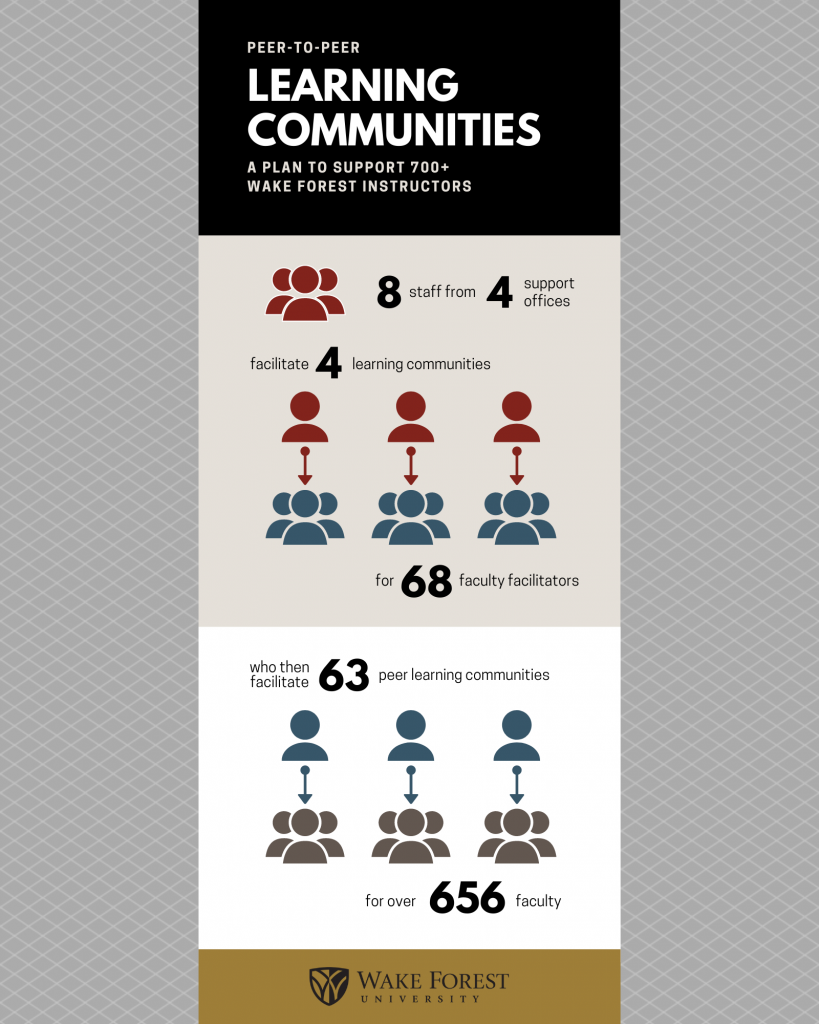Peer to Peer Learning Community Initiative (Summer 2020)
The CAT, Office of Online Education, members of ZSR Library’s Digital Initiatives team, and the Academic Technologies unit in IS launched an ambitious program to support 750+ Wake Forest instructors as they prepared for the potential of a fall semester online. The Peer to Peer Learning Community Initiative brought together 68 faculty members to participate in a 4-week learning community that prepared them to facilitate their own learning communities with their colleagues in their departments throughout the summer.
This approach was faculty-centered, allowing our teachers to support one another as they prepared solutions for the fall. It honored the amazingly creative work so many of our instructors were doing already, allowed for disciplinary-specific guidance, and–most importantly for the CAT–created opportunities for departments to have meaningful conversations about teaching that would reach far beyond a single semester.
More details about this program can be found below.

Initiative Details
The literature on faculty learning communities suggests that 8-15 participants is an ideal number. As a result, we worked together with our facilitators to create cohorts of 8-15 faculty clustered within and around departments. Some large departments had multiple cohorts, some small departments were combined with adjacent disciplines, and we had 8 interdisciplinary cohorts. Participants were free to request a new cohort if they felt it was more appropriate for their teaching and learning needs.
You can learn more about who facilitated each cohort, when they were convened, and the themes of our interdisciplinary cohorts at the bottom of our Communities page, under Past Learning Communities.
The CAT worked together with deans and department chairs to identify facilitators for each cohort. Some cohorts are led by two co-facilitators who are splitting the work, as well as the stipend.
Peer facilitators were expected to devote around 120 hours (the equivalent of teaching a single course, or 20% of a semester’s load) to this position. This included at least 60 hours of direct support for faculty in their cohort, as well as 60 hours preparing for that work in a peer facilitator learning community (PFLC).
We ran the formal aspects of the learning communities from Monday, June 15th through Friday, July 10th. Following the schedule below, peer facilitators spent two intensive weeks with one another followed by two weeks of independent preparation.
- June 15-19: 5 hours of synchronous sessions; 15 hours of reading/activities
- June 22-26: 5 hours of synchronous sessions; 15 hours of reading/activities
- June 29-July 3: 10 hours of mostly independent work with peer and facilitator feedback
- July 6-10: 10 hours of mostly independent work with peer and facilitator feedback
These learning communities were designed to support participants as they embarked on the significant task of redesigning each of their fall courses. As a result, we were mindful of limiting additional work so far as possible. To the extent that there were any additional expectations beyond the work of designing the courses themselves, it was structured to make that process more productive and efficient. Our goal was simple: to create opportunities for faculty to learn and design alongside their peers so that they were not laboring alone on an island.
To ensure equity, we asked that faculty spend at least 40 hours working on their courses with their peers. Within that broad framework, however, peer facilitators were free to structure those hours to meet the needs of their cohort. We recommended a 2-week window with at least 5 hours of “live” synchronous work, but many opted for alternative schedules.
Peer facilitators scheduled their learning communities to meet the needs of their cohorts, which meant they were run on a staggered schedule throughout the summer. The first set launched on Monday, July 13th and the last launched on Monday, August 10th.
Any Wake Forest instructor scheduled to teach a course in the fall of 2020 was eligible to participate in the peer learning communities. This included tenure-stream faculty, teaching professionals, visiting professors, postdoctoral fellows, part-time instructors, and staff who teach courses. Full-time faculty not teaching in the fall were also eligible to opt into the program.
The CAT never requires participation in any of our programs. However, all deans on the Reynolda campus expected that most of their faculty would want to participate. Each dean shared details about their expectations, as well as standards for waving those expectations, here. In the end, more than 92% of Wake Forest instructors participated in the program (632 of 690 fall instructors, 24 faculty on teaching leave, and 68 peer facilitators).
Yes. Both the peer facilitators and the participants were compensated for their time. Peer facilitators received a $6,500 stipend and all participants received a $1,500 stipend.
